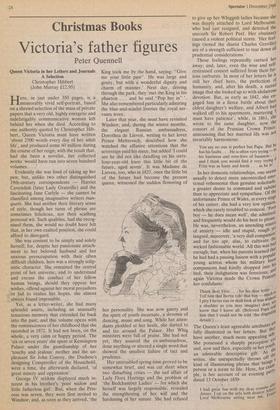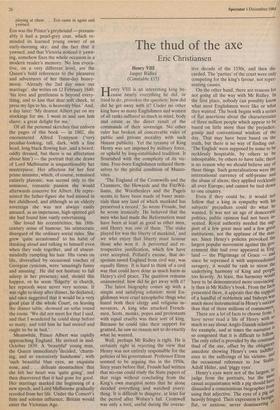Christmas Books
Victoria's father figures
Peter Quennell
Queen Victoria in her Letters and Journals A Selection Christopher Hibbert (John Murray £12.95)
Here, in just under 350 pages, is a memorably vivid self-portrait, based on a shrewd selection of the mass of private papers that a very old, highly energetic and indefatigably communicative woman left behind her when she died. According to one authority quoted by Christopher Hib- bert, Queen Victoria must have written 'about 2500 words every day of her adult life', and produced some 60 million during the course of her reign; with the result that, had she been a novelist, her collected works 'would have run into seven hundred volumes . .
Evidently she was fond of taking up her pen; but, unlike two other distinguished 19th-century correspondents — Harriet Cavendish (later Lady Granville) and the fascinating Jane Carlyle — she cannot be classified among imaginative writers man- quees. She had neither their literary sense of style, though her turns of phrase are sometimes felicitous, nor their scathing personal wit. Such qualities, had she recog- nised them, she would no doubt have felt that, in her own exalted position, she could afford to disregard.
She was content to be simply and solely herself; for, despite her passionate attach- ment to her beloved husband and her anxious preoccupation with their often difficult children, hers was a strongly solip- sistic character. She remained the central point of her universe; and to understand and excuse the conduct of her fellow human beings, should they oppose her wishes, offend against her moral prejudices or fail to realise her hopes, she almost always found impossible.
Yet, as a letter-writer, she had many splendid assets, including an unusually tenacious memory that extended far back into the past; and this volume opens with the reminiscences of her childhood that she recorded in 1872. It had not been, on the whole, a very calm or happy period. The 'six or seven years' she spent at Kensington Palace under the guardianship of her 'touchy and jealous' mother and the un- pleasant Sir John Conroy, the Duchess's designing Comptroller of the Household, were a time, she afterwards declared, 'of great misery and oppression'.
George IV seldom displayed much in- terest in his brother's 'poor widow and little fatherless girl'. But, when the Prin- cess was seven, they were first invited to Windsor; and, as soon as they arrived, 'the King took me by the hand, saying: "Give me your little paw". He was large and gouty, but with a wonderful dignity and charm of manner.' Next day, driving through the park, they 'met the King in his phaeton . . . and he said "Pop her in" '. She also remembered particularly admiring the blue-and-scarlet liveries the royal ser- vants wore.
Later that year, she must have revisited Windsor; and, during the winter months, the elegant Russian ambassadress, Dorothea de Lieven, writing to her lover Prince Metternich, described how she watched the effusive attentions that the sovereign paid his niece, but added 'I could see he did not like dandling on his sixty- four-year-old knee this little bit of the future, aged seven'. It was Madame de Lieven, too, who in 1837, once the little bit of the future had become the present queen, witnessed the sudden flowering of her personality. She was now gaiety and the spirit of youth incarnate, a devotee of dancing, music and song. While her atten- dants plodded at her heels, she darted to and fro around the Palace. Her Whig ministers were full of praise. She had not yet, they assured the ex-ambassadress, done anything or uttered a single word that showed the smallest failure of tact and prudence.
Her untroubled spring-time proved to be somewhat brief, and was cut short when two disturbing crises — the sad affair of Lady Flora Hastings and the problem of 'the Bedchamber Ladies' — for which she herself was largely responsible, revealed the strengthening of her will and the hardening of her nature. She had refused
to give up her Whiggish ladies because she was deeply attached to Lord Melbourne, who had just resigned, and detested the uncouth Sir Robert Peel. Her obstinacy caused a violent political storm. 'Her feel- ings (noted the diarist Charles Greville) are of a strength sufficient to tear down all prudential considerations.'
Those feelings repeatedly carried her away; and, later, even the wise and self- restrained consort suffered from their fur- ious outbursts. In most of her letters he Is still her chief hero, the perfection of humanity, and, after his death, a sacred image that she looked up to with idolatrous devotion. But, as early as 1842, she en' gaged him in a fierce battle about theft eldest daughter's welfare, and Albert had walked off to his apartments, muttering 'I must have patience'; while, in 1861, she wrote to the same daughter, now the consort of the Prussian Crown Prince, announcing that her married life was not invariably harmonious: You say no one is perfect but Papa. But he has his faults . . He is often very trying — in his hastiness and over-love of business • and I think you would find it very trying 1 Fritz was as hasty and harsh . . . as he is!
In her domestic relationships, one seals usually to detect more uncontrolled emo- tional vehemence than genuine solicitude, a greater desire to command and subdue than to appreciate and sympathise. Of the unfortunate Prince of Wales, at every stage of his career, she had a very low opinion, which she rarely troubled to conceal. '1)0°,r boy — he does mean well', she admitted' and frequently would do his best to please; He was, nevertheless, an unending source of anxiety — idle and stupid, rough yet languid, moreover, 'a very dull compar0,, and far too apt, alas, to cultivate to,' wicked fashionable world. All this was bad enough; but, when his parents learned that he had had a passing liaison with a poPulan young actress whom his military b°,_°5 companions had kindly dropped into old bed, their indignation was ferocious; an again Victoria made the Crown Princess her confidante: Thank dear Fritz . . . for his dear letter . • Tell him that Bertic (oh! that boy —much ij351 I pity I never can or shall look at him wi111°,,,-t
a shudder as you may imagine) does Id to! know that I know all. (Beloved Papa him that I could not be told 'the disgusnlir details') . . .
The Queen's least agreeable attributes are fully illustrated in her letters. But they have have another, much more appealing Siuve.. She possessed a sharply perceptive ell. and, now and then, especially in her you the an admirable descriptive gift. As she writes, she unexpectedly throws off t 3 kind of illuminating phrase that brings„, person or a scene to life. Here, for exam ple, is her account of an evening 10'1' dated 13 October 1839: • fter I had great fun with my dear cousins 1j rti dinner: I sat on the sofa with dearest Albcco Lord Melbourne sitting near me. Ern playing at chess . . . Eos came in again and yawned.
Eos was the Prince's greyhound — presum- ably it had a pearl-grey coat, which re- minded its learned young owner of an early-morning sky; and the fact that it yawned, and that Victoria noticed it yawn- ing, somehow fixes the whole occasion in a modern reader's memory. No less evoca- tive, on a very different level, are the Queen's bold references to the pleasures and adventures of her three-day honey- moon. 'Already the 2nd day since our marriage', she writes on 12 February 1840; `his love and gentleness is beyond every- thing, and to kiss that dear soft cheek, to press my lips to his, is heavenly bliss.' And, a day later: `My dearest Albert put on my stockings for me. I went in and saw him shave; a great delight for me.' Of all the personal sketches that enliven the pages of this book -- in 1862, she encountered Alfred Tennyson (`very peculiar-looking, tall, dark, with a fine head, long black flowing hair, and a beard; oddly dressed, but there is no affectation about him') — the portrait that she draws of Lord Melbourne is unquestionably her masterpiece. Her affection for her first prime minister, which, of course, remained entirely platonic, was second only to the sensuous, romantic passion she would afterwards conceive for Albert. He repre- sented the father-figure she had missed in her childhood; and although as an elderly sovereign she was not always easily amused, as an impetuous, high-spirited girl she had found him vastly entertaining. She loved his eccentricities, his 18th- century sense of humour, his aristocratic disregard of the ordinary social rules. She grew 'quite accustomed' to his habit of thinking aloud and talking to himself even when they rode together, and of absent- mindedly rumpling his hair. His views on life, diversified by occasional touches of Georgian cynicism, were 'amazingly funny and amusing'. He did not hesitate to fall asleep in her presence; and, should this happen, or he seem 'fidgetty' in church, her reproofs were never very serious. It was right to sleep after dinner, he declared, and once suggested that it would be a very good plan if the whole Court, on leaving the dinner table, drowsed on sofas round the room. 'We did not meet for that I said, and that I wondered he could sleep before so many, and told him he had snored and ought to be in bed.' Meanwhile, Prince Albert was rapidly approaching England. He arrived in mid- October 1839. A 'beautiful' young man, the Queen immediately 'decided, 'charm- ing, and so excessively handsome', with `such beautiful blue eyes, an exquisite nose, and . . . delicate moustachios' that she felt her heart was 'quite going', and then discovered that it had gone for good. Her marriage marked the beginning of a new epoch; and Lord Melbourne gradually receded from her life. Under the Consort's firm and solemn influence, Britain would enter the Victorian Age.























































 Previous page
Previous page